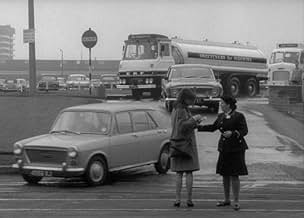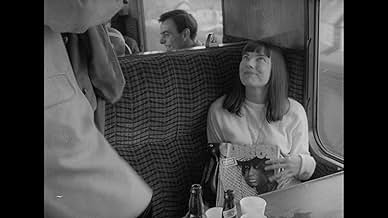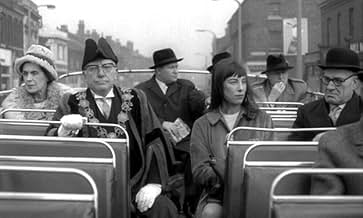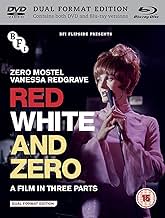An impassive young girl is taken from her suicidal big-city life back to a city in the North of England on a bizarre bus trip. Seen through the poetic eye of the camera, this is a commentary... Read allAn impassive young girl is taken from her suicidal big-city life back to a city in the North of England on a bizarre bus trip. Seen through the poetic eye of the camera, this is a commentary of doomed British morbidity.An impassive young girl is taken from her suicidal big-city life back to a city in the North of England on a bizarre bus trip. Seen through the poetic eye of the camera, this is a commentary of doomed British morbidity.
Allan O'Keefe
- Supporter
- (as Alan O'Keefe)
Dennis Alaba Peters
- Mr. Wombe
- (as Alaba Peters)
Featured reviews
This film had a big impact on me. Saw first saw it on BBC2 in the 70's as part of a Anderson Retro. Originally based on Delaney's book Red, White & Zero it was a three director/stories feature film. Although the other two parts were never finished. That's why the film doesn't have titles.
The reason why I loved this film was because I grew up in a slum clearance area of Liverpool. The film's landscape was exactly the same. Everything demolished - except for the pubs. I'd never seen anything like it on TV before.
I recently got another chance to see it and loved it. The story follows a girl who is fed up with working in London. The shot opens with her at a desk while the legs of a hanged fellow worker dangle from the celling. She leaves London - tired and fed up - and goes home to Manchester (although parts of the film were filmed in Birmigham). She stands at a desolate bus stop in the middle of demolished terraces. When along comes the white bus - it's a tour guided ride which shows the best of the city. What makes it even more special is that the bus is on it's maiden voyage. The Lord Mayor (Arthur Lowe) and other dignitaries ride the bus on a tour of factories, libraries and even a civil defence demo. At the end of the tour the girl winds up in a small cafe watching, inside what look like married couple. Thier love and passion for the small things in life mesmerises and charms the girl - reminding her what life's all about.
For Delaney it's like Charlie Bubbles - dealing with leaving your home town and looking at the effect it has on you. For Anderson it's yet another example of his cinematic poetry - like If... and Sporting Life. This film is a very special film by very special people. Oh thank you for making it.
The reason why I loved this film was because I grew up in a slum clearance area of Liverpool. The film's landscape was exactly the same. Everything demolished - except for the pubs. I'd never seen anything like it on TV before.
I recently got another chance to see it and loved it. The story follows a girl who is fed up with working in London. The shot opens with her at a desk while the legs of a hanged fellow worker dangle from the celling. She leaves London - tired and fed up - and goes home to Manchester (although parts of the film were filmed in Birmigham). She stands at a desolate bus stop in the middle of demolished terraces. When along comes the white bus - it's a tour guided ride which shows the best of the city. What makes it even more special is that the bus is on it's maiden voyage. The Lord Mayor (Arthur Lowe) and other dignitaries ride the bus on a tour of factories, libraries and even a civil defence demo. At the end of the tour the girl winds up in a small cafe watching, inside what look like married couple. Thier love and passion for the small things in life mesmerises and charms the girl - reminding her what life's all about.
For Delaney it's like Charlie Bubbles - dealing with leaving your home town and looking at the effect it has on you. For Anderson it's yet another example of his cinematic poetry - like If... and Sporting Life. This film is a very special film by very special people. Oh thank you for making it.
Odd little movie in which some girl rides around on a tour bus. Nothing really happens. Some of the people here talk about wonderful performances, but really, there's the occasional brief conversation and a lot of touring. There are some cute moments, like some odd character going on about class distinctions, but mainly this just seems to have no point to it at all.
Yet for some reason it has a lot of favorable reviews. And the only thing I can think of is that there are British people who recognize some of the sites and the sorts of people and it takes them back to that time or gives them that feeling of connection. But I've never been to England and to me this was just a huge waste of time.
Yet for some reason it has a lot of favorable reviews. And the only thing I can think of is that there are British people who recognize some of the sites and the sorts of people and it takes them back to that time or gives them that feeling of connection. But I've never been to England and to me this was just a huge waste of time.
A strange, moody, yet captivating film that captures the atmosphere at a certain time in Britain. I love the images of the terrace houses, the back alleyways and bombed out areas. I grew up just off Holderness Road in Hull and the images gave me a flashback to that time. The air is heavy with coal smoke, the roads have few cars and kids are playing in the streets, whilst the people all look gray like in a Lowry painting. The silent parts are the best as the images speak for themselves.
The humour is nicely understated. My particular favorite is the scene with the lift and the security guard.
I not sure what messages the film is seeking to convey, but as an observation piece it is superb.
The humour is nicely understated. My particular favorite is the scene with the lift and the security guard.
I not sure what messages the film is seeking to convey, but as an observation piece it is superb.
The short film, The White Bus, wanted to be an odd film instead turned into a tourist film. Honestly not much happens in the film. I have seen short films with better story lines and character development than the White Bus.
Though it was beautifully filmed.
If you are interested to see a film about Britain in the late 1960's then this film is for you.
Though it was beautifully filmed.
If you are interested to see a film about Britain in the late 1960's then this film is for you.
This review is for Red, White and Zero. It's possible to reconstruct the facts around this film, but the IMDb listing is confusing. Lindsay Anderson's The White Bus was briefly and unsuccessfully released with two other shorts: a very short film by Peter Brook featuring Zero Mostel in a hurry (The Ride of the Valkyries - lots of frantic mugging), and Red and Blue by Tony Richardson. Only Lindsay Anderson's film seems to be readily available. (The others would make good Criterion extras.)
I saw Red, White and Zero on late night Australian television in 1984. The White Bus wasn't seen to best effect on the small screen - rather self-consciously poetic, but as an Anderson film it will obviously bear reseeing. Red and Blue was fascinating and not very good. Tony Richardson was in love with the Nouvelle Vague, and raided its box of tricks and its composers (Bassiak from Jules and Jim; Duhamel from Godard's Pierrot le Fou) in an imitation Demy/Moreau vehicle for Vanessa Redgrave! She fluted a song in English, and Kevin Brownlow provided the jumpcuts. (You can hear her singing Bassiak's Bonjour Papa on YouTube).
Most weirdly, the sex interests for the romantically-besieged Vanessa were provided by Douglas Fairbanks Jr, William Sylvester (the scientist from Kubrick's 2001), and Michael York. The sparks didn't exactly fly. Anyway, after 30 years, it's time to make this available again.
I saw Red, White and Zero on late night Australian television in 1984. The White Bus wasn't seen to best effect on the small screen - rather self-consciously poetic, but as an Anderson film it will obviously bear reseeing. Red and Blue was fascinating and not very good. Tony Richardson was in love with the Nouvelle Vague, and raided its box of tricks and its composers (Bassiak from Jules and Jim; Duhamel from Godard's Pierrot le Fou) in an imitation Demy/Moreau vehicle for Vanessa Redgrave! She fluted a song in English, and Kevin Brownlow provided the jumpcuts. (You can hear her singing Bassiak's Bonjour Papa on YouTube).
Most weirdly, the sex interests for the romantically-besieged Vanessa were provided by Douglas Fairbanks Jr, William Sylvester (the scientist from Kubrick's 2001), and Michael York. The sparks didn't exactly fly. Anyway, after 30 years, it's time to make this available again.
Did you know
- TriviaTheatrical movie debut of Sir Anthony Hopkins (Brechtian).
- ConnectionsFollowed by Red and Blue (1967)
- SoundtracksResolution der Kommunarden
Performed by Anthony Hopkins
Lyrics by Bertolt Brecht / Music by Hanns Eisler
- How long is The White Bus?Powered by Alexa
Details
- Runtime46 minutes
- Color
- Aspect ratio
- 1.37 : 1
Contribute to this page
Suggest an edit or add missing content



























